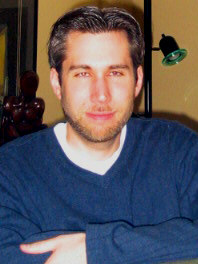Benjamin Vogt
"Rural Kiss" simply began as one of my first attempts to write a sonnet. I'd been trying to work with the English sonnet, but the darn couplet at the end just ruins any sort of momentum and lyricism. So, I tried the Italian sonnet. This form is much more adaptable to the moment of writing, and even in editing, by having the comparatively large sestet to do with as you please (I'm talking about both the fact that it has six lines vs. two, and you can do anything you want as far as end rhyme patterns). Of course, you can write a "sonnet" any which way you choose, but I prefer bending rules vs. breaking them.
"Portraiture" is in blank verse, perhaps my favorite form; it comes easily to me (it didn't used to), and helps my ideas flow more smoothly and freshly than -- most times -- free verse or other received forms. It's probably because the iambic pentameter line really IS about the same length of a breath, a common everyday sentence in conversation, and the three seconds of our short-term memory discussed by Frederick Turner. Plus, blank verse seems aptly suited, to my ear, to Midwestern culture and sensibilities: a bit methodic, a bit calculated, a bit distant and careful. I guess it's my default as I write on my collection of family photographs from the last two centuries.
__________________________________________
Portraiture at Blanks' Photography – Weatherford, 1978
Her hand upon his chest like buttress, palm
in shallow rest between his tie and coat,
how its fingers curl just softly pleading this
is not what's kept him on his feet. With him
beside her–thinner lips and whiter skin
and the gray like panhandle snow–
the months of rest, appointments, and endless nights
refuse to linger in their steadfast smiles.
He's the husband, father of boys and land
and real estate, a dozen parcels west of town
where wind from two directions holds
the wheat erect, defiant. Where late
into the harvest night, he hears the shallow
whisper that all grown men refuse to hear.
Between the whirling thrush of dust and stalks
chipped by the combine–the time it takes
to re-approach from the distant lines of wheat–
he knows the summer night that cools his cheek
is just a careful prelude, patient push
into the friction of his aging body
like stones pressed into a façade, the mortar
of earth and water loose against a stolid frame.
He knows that as the distant night's work
will go on until it's done–until the necessary
reaping of earth and months of dusting fields
and irrigation end–no stalk, no tree,
no God could hold him any nearer life
than the imprint of the morning's photograph,
the gentle hand still warm against his body.
He imagines, in the nearing lights of combine,
a careful way of leaving simply without
the circling eyes, near whisper of machines
that pulse into his heart, without the thrush
of sudden memory piercing through the air.
He imagines, as the load of grain is siphoned
to the truck bed, how sudden form can falter–
how watching lifted fields now fall like rain,
that even a few firm stalks have made it past
as if threaded through the terror purposely,
released into the rush, become the silent whole.
Rural Kiss–Oklahoma, 1944
Because she's saying her goodbyes your bodies
writhe like clothesline shirts, the briefest touch
felt deeper than her coat's arm like the clutch
of Chevy parked behind, its chrome a frieze
which cools her arching back. You push valise
away like an airplane's wheel block, insomuch
to steady your expressions–hers in such
untangled wonder and lusty indices.
But yours is black and white, eyes open, a search
for something past her curling hair which fades
the house, the drive, street sloped and glistening.
Today avoids you, your memory a perch
from which a distant and voiceless sound invades –
without the war all love is just routine.
_________________
 Benjamin Vogt is a PhD candidate in both poetry and creative nonfiction at the University of Nebraska-Lincoln and has an MFA from The Ohio State University. He has been nominated for the Pushcart Prize in two genres, received a grant from the Dorothy Sargent Rosenberg Memorial Fund, and the Louise Vansickle Fellowship. Poems and prose have appeared in Crab Orchard Review, Cream City Review, Ellipsis, Fugue, Puerto del Sol, and Verse Daily. A poetry chapbook, Indelible Marks, is available from Pudding House.
Benjamin Vogt is a PhD candidate in both poetry and creative nonfiction at the University of Nebraska-Lincoln and has an MFA from The Ohio State University. He has been nominated for the Pushcart Prize in two genres, received a grant from the Dorothy Sargent Rosenberg Memorial Fund, and the Louise Vansickle Fellowship. Poems and prose have appeared in Crab Orchard Review, Cream City Review, Ellipsis, Fugue, Puerto del Sol, and Verse Daily. A poetry chapbook, Indelible Marks, is available from Pudding House.